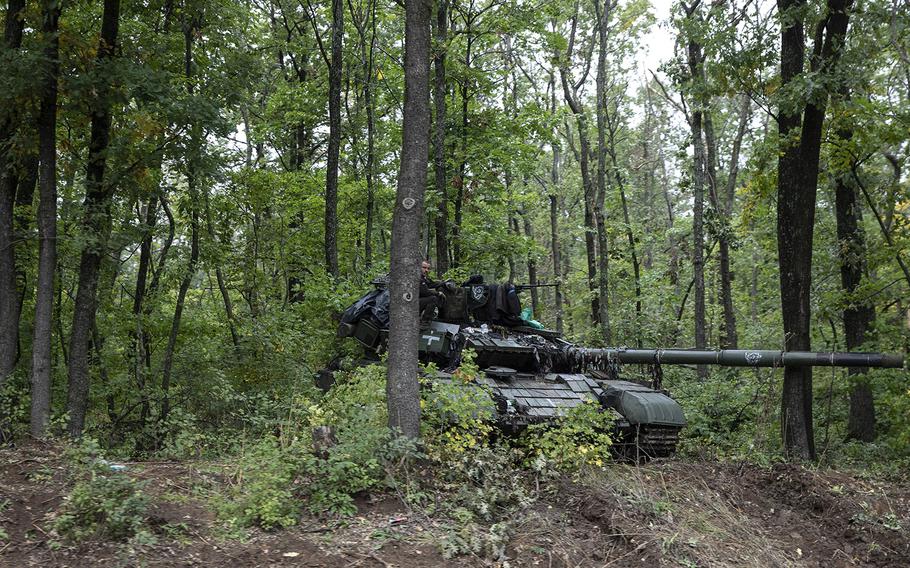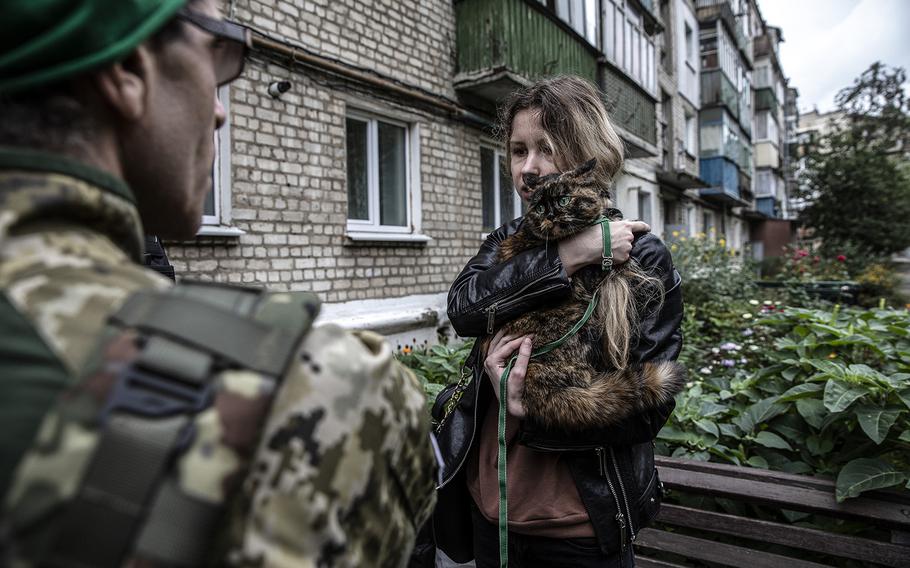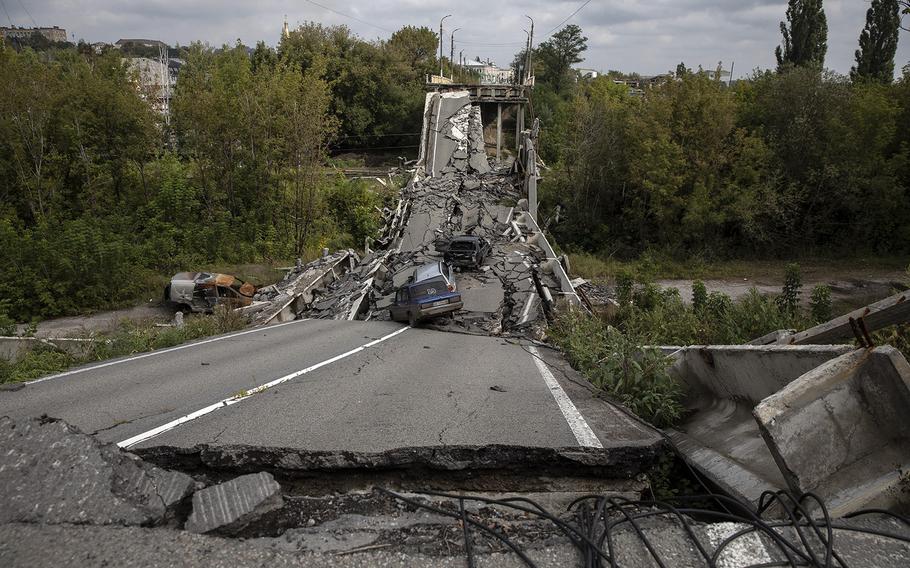Europe
Ukrainian troops drive Russian tanks on new front line
The Washington Post September 17, 2022

A Ukrainian soldier by a Russian tank captured by Ukrainian forces in the woods in the outskirts of Kupiansk, Ukraine, on Sept. 16, 2022. (Heidi Levine for The Washington Post )
KUPIANSK, Ukraine — The front line is now a river, the Oskil, that runs through the middle of the eastern Ukrainian town of Kupiansk. On one side are the charging Ukrainian forces who have pushed their Russian enemies almost entirely out of the northeastern Kharkiv region during a sweeping counteroffensive this month.
From her bedroom window, Liza Udovik, 26, has a view of the other side, to where the Russians have retreated. The sound of outgoing fire from the Ukrainians rocked her apartment these past few days, when the Ukrainian military moved into Kupiansk and the town became a battleground. Russian tanks and armored vehicles still patrol the streets, but it's the Ukrainians driving them, using the Russians' own abandoned weapons against them.
Udovik started counting the seconds between hearing the deafening boom of artillery launched and the appearance of smoke in the distance. From just Tuesday to Wednesday, the gap got longer, stretching from 9 seconds to 13.
"They're getting pushed back," she said with a smile.
The Oskil became a shield for the Russians on Sept. 9. As the Ukrainians closed in, the invading forces crossed the bridge and blew it up behind them to slow Kyiv's advance. And Kupiansk was suddenly cut off from its second half. The next morning, 55-year-old Lena Danilova stared in confusion at the Ukrainian vehicles driving down the town's streets. A man next to her tugged on her sleeve, pointing out the different uniforms on the soldiers now patrolling the area.
"Look, these are our boys," he whispered to her. Danilova said she wiped away tears of joy.
"Finally," she said. But then she had a sick realization. Two of her children were stuck on the other side of the river. They had gone to attend a school there just days before. Now it's where the line where the Russians are desperate to stop Ukraine's hard-charging advance further south, into the occupied Donetsk and Luhansk regions.

Liza Udovik, 26. holds her cat named Masato as she speaks to a volunteer that is helping her and other residents that evacuated their home in Kupiansk, Ukraine, on Sept. 16, 2022. (Heidi Levine for The Washington Post )
After Kupiansk was captured without a fight just three days into the war, the town was at least spared Russian bombardment. Now people here are confronting some of the horrors of war that other Ukrainians lived through months ago. They waited and hoped for Ukrainian liberation, many said, but they didn't imagine it would be like this: the threat of Russian shelling, no power in the city and no way to get basic medicines. Locals packed their most essential belongings quickly and evacuated in a rush with volunteers this week, evoking images of the first days of the war.
Valya, 58, left behind her cats. Bowls with water with them lined the floor of her apartment, and she left a key with her friend to feed them.
With only Russian state television channels, a Kremlin propaganda tool, available in Kupiansk for the past six months, people were cut off from independent news about what was happening in Ukraine. The Russian government prohibits media from even naming this a war, preferring to call it a "special military operation" and information is tightly controlled.
While evacuating with her mother, Udovik was asked if she knew about the atrocities Russian soldiers committed against civilians in Bucha, including torture and killings - what had been major international news in April. Udovik shook her head.
"Bucha?" Udovik said. "I think I heard something about it, but I'm not sure." The Russian channels she sometimes watched focused instead on how Europe might be facing an energy crisis this winter with Russian natural gas flows cut, she said.
People spoke in hushed voices about what transpired during occupation because they say a portion of the population is sympathetic to Moscow, and if the Russian soldiers return, then neighbors could inform on neighbors. Udovik's own family was torn apart by it. Her grandmother stopped speaking to her sister after she hung a Russian flag outside her home.
On Feb. 27, just three days after Russia launched its unprovoked full-scale invasion, Kupiansk's mayor, Gennady Matsegora, posted a video on Facebook admitting that he surrendered the city over to the Russian military. Matsegora was a member of Ukraine's pro-Russian party.
"Today at 7:30 a.m. the commander of a Russian battalion called to propose negotiations," he said. "If declined, the city would be stormed 'with all the consequences.' I decided to take part in the talks to avoid casualties and destruction in the city."

Vehicles are seen on and around a damaged bridge in Kupiansk, Ukraine, on Sept. 16, 2022. Ukraine’s surprise counteroffensive in the Kharkiv Oblast forced Russian forces to retreat from Kupiansk and other key cities in the region. (Heidi Levine for The Washington Post )
Udovik, who considers herself a Ukrainian patriot, acknowledged that Matsegora will almost certainly be considered a traitor. But her own feelings are complicated.
"For citizens of course, that decision probably did save lives," she said. "We didn't hear these explosions we hear now. In the beginning it was quiet, but we knew that eventually, this would all start."
The Russians used Kupiansk as the seat of their occupation government. A propaganda radio station, called "Kharkiv-Z" - the letter "Z" has become a symbol of the Russian military - blared through local shops. Residents could only make calls to Russia. Even without formal annexation, the town became so integrated into Russia that Udovik even had a relative visit from Vladivostok, the Far East Russian city near the North Korean border. The Moscow-established authorities advertised that people could receive Russian passports.
Danilova said she was forced to send her children to school, even though she knew Russian curriculum would be taught. People were threatened that if they didn't, their parental rights could be revoked. Others said they feared the strict 8 p.m. curfew because there were rumors of people disappearing if they were caught outside past time.
The Russians had used Kupiansk as a transport hub, moving hundreds of tanks and armored personnel vehicles through it and toward what was then the front line. Some of those same vehicles are back - trophies of the Ukrainian military using the equipment Russians left behind during their retreat.
On Thursday, as the sounds of outgoing fire reverberated through the town, shells crashing on the liberated side of the river were scarcely heard - a sign that Russians' ammunition depots could be depleted after Ukrainian strikes and a quick withdrawal that forced them to abandon or destroy much of it.
On the road into Kupiansk, the Ukrainians were transporting pontoon bridges, preparing to cross the river and continue their advance. The sign announcing the town, painted white, red and blue - the colors of the Russian flag - was torn down and in ruins.